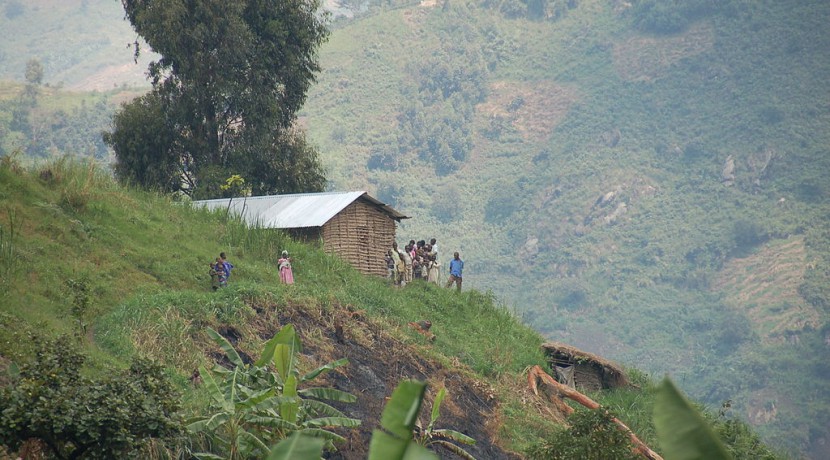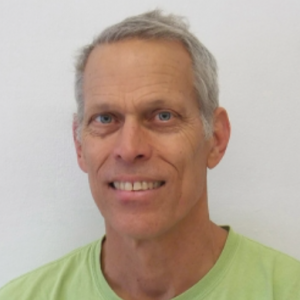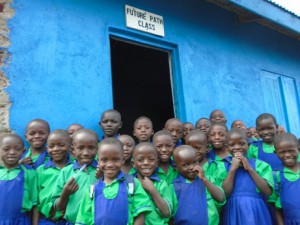Transhumanist Hank Pellissier on Being an “Atheist Missionary”
Hank Pellissier is certainly an inimitable individual. As a transhumanist and humanitarian, he applies science and technology to inform his approach to alleviating suffering, such as through his efforts to supplement the diet of the Philippines’ Mangyan community with soylent to improve brain health and nutrition. Currently, his work as the director of the Brighter Brains Institute is focused in Uganda, where he spearheads projects to establish and support humanist schools, health clinics, and orphanages.
This past week, he agreed to answer some of my questions about his modus operandi and how humanism fits into his life stance and way of being.

Brighter Brains is engaged in the Rwenzori Mountains of Western Uganda (Photo by Dylan Waters)
Jessica Xiao: What is your theory of change and how did that lead to Brighter Brains?
Hank Pellissier: I believe responsible people should strive to create utopia, paradise on earth, equal opportunities for all and the annihilation of suffering. To be an ethical human is to care about and work deeply for others who are less fortunate, and strive in community for the greater social good. Change is putting vision into practice. Brighter Brains Institute (BBI) is a community that invites others to perform good deeds in the world.
Xiao: What does the Brighter Brains Institute do?
Pellissier: BBI is presently engaged in western Uganda, helping sixteen schools that we either built or financially support. Eleven of these are humanist schools. We provide food, shoes, clothes, books, reusable sanitary pads (provided by AFRIpads), school supplies, and medical care for the children. We build classrooms, we provide teacher salaries, and we launch businesses like motorcycle rental and chicken farms to earn income for the schools. We work with many women’s collectives, and we emphasize women’s equality. We promote humanism with Code for Global Ethics: Ten Humanist Principles by Rodrigue Tremblay as our main source material. Our most recent campaign is to distribute condoms to secondary schools and to teach sex education, family planning, and birth control. At our humanist schools, we forbid religious influence.
Xiao: Why work in Uganda?
Pellissier: Uganda is poor—this allows us to accomplish an enormous amount with our budget. Five hundred US dollars pays a medic to work at our clinic for a year. Twenty-five dollars in food can feed 250 children lunch per day. One thousand dollars can build a classroom for sixty children. We can keep an orphan in school for a year by paying his forty-six dollar tuition.
Uganda is also relatively safe, people speak English, the landscape is beautiful, the culture is fascinating, and there is already a humanist presence there. We work almost exclusively with the Bakonzo tribe, an ethnic group that I find very wonderful to interact with.
We’re also in the Rwenzori Mountains region, and I like to hike.
[caption id="attachment_16723" align="alignright" width="300"] Hank Pellissier[/caption]
Xiao: What is the difference between a humanist school and other schools in Uganda? Are there humanist schools in other countries in Africa?
Pellissier: When Uganda gained independence in 1962, the public education system was largely handed over to the Anglican and Catholic Churches, because they were the only institutions large enough and wealthy enough to administer it. Subsequently, these churches have had an enormous indoctrinating influence on Ugandan school children and on the culture itself. Catechism is taught in many public schools, and about 50 percent of the schools in the region we work in are parochial. Ugandans are extremely religious, i.e., superstitious, particularly in their belief in the power of prayer. The consequence of this religiosity in Uganda is that the nation is now one of the world’s most homophobic nations, and women are frequently treated as powerless, second-class citizens.
Our humanist schools emphasize that human intelligence, power, and education is the path towards societal improvement—not prayer! Just stating this is huge—and blasphemous. The humanist principles we teach in our schools offer other progressive ideas that have little to do with a god. This is useful in getting people to relax their tribalism. It’s not generally reported in Western media, but there is inter-tribal conflict throughout Africa. The Bakonzo, for example, have had deadly skirmishes with the Batoro and Basongora tribes.
Xiao: Is it dangerous for a student to go to a humanist school instead of a Christian school? If it is, how do you mitigate the risk for those who identify as nonreligious?
Pellissier: So far, there have been no risks at all. We are operating in a region that seems to be about 62 percent Anglican, 32 percent Catholic, and about 5 percent Muslim. I estimate that based on the number of schools operated by each. There seems to be no animosity between those religions. There is violence in the region occasionally, but it is always “tribal”—one tribe attacking the other.
Xiao: You once described yourself as an “atheist missionary.” What do you mean by this?
Pellissier: Being an atheist missionary just means I am proselytizing the abandonment of religion in Africa. I am actively working to convince people to leave their foolish and damaging creeds. I was raised Catholic and told many stories of priests hiking into jungles to convert tribes. I am repairing their mistakes. I am hiking in and telling them to abandon the false religions. I mean that literally, in some cases. Several of the schools we work with can only be accessed by trails. Steep trails. I fell over a cliff last time I went and infected my foot, ending up in the ER when I returned. But it was worth it; we went to a village where the inhabitants had never seen white people. They were frightened at first.
Xiao: These inhabitants who had never seen white people—had they internalized Christianity or Catholicism? Have their lives been negatively impacted by Ugandan society or had they been living relatively independent of Western religion?
Pellissier: Christian churches were established in the remote places we visited. I don’t think there is any place in Uganda untainted by Western religion.
Xiao: You are described as a transhumanist and techno-optimist. What does that mean?
Pellissier: I half-seriously define transhumanists as the “people who want to live forever and are willing to become robots to do this.” Transhumanists are those who regard technology as a wondrous path to an improved future. They are frequently optimistic in their forecasts; for example, many believe the so-called singularity will arrive around 2045 in the form of smarter-than-human Artificial Intelligence that will easily solve problems that stump the “meat-bag” intellect.
I would prefer to not die, or at least die only when I was willing to do so. I would be fine with a machine heart and machine organs and unbreakable metal bones, as long as my brain and feelings remained human.
Xiao: You have been credited with use of the term “transhumanitarianism.” What do you mean by that?
[caption id="attachment_16724" align="alignleft" width="300"]
Hank Pellissier[/caption]
Xiao: What is the difference between a humanist school and other schools in Uganda? Are there humanist schools in other countries in Africa?
Pellissier: When Uganda gained independence in 1962, the public education system was largely handed over to the Anglican and Catholic Churches, because they were the only institutions large enough and wealthy enough to administer it. Subsequently, these churches have had an enormous indoctrinating influence on Ugandan school children and on the culture itself. Catechism is taught in many public schools, and about 50 percent of the schools in the region we work in are parochial. Ugandans are extremely religious, i.e., superstitious, particularly in their belief in the power of prayer. The consequence of this religiosity in Uganda is that the nation is now one of the world’s most homophobic nations, and women are frequently treated as powerless, second-class citizens.
Our humanist schools emphasize that human intelligence, power, and education is the path towards societal improvement—not prayer! Just stating this is huge—and blasphemous. The humanist principles we teach in our schools offer other progressive ideas that have little to do with a god. This is useful in getting people to relax their tribalism. It’s not generally reported in Western media, but there is inter-tribal conflict throughout Africa. The Bakonzo, for example, have had deadly skirmishes with the Batoro and Basongora tribes.
Xiao: Is it dangerous for a student to go to a humanist school instead of a Christian school? If it is, how do you mitigate the risk for those who identify as nonreligious?
Pellissier: So far, there have been no risks at all. We are operating in a region that seems to be about 62 percent Anglican, 32 percent Catholic, and about 5 percent Muslim. I estimate that based on the number of schools operated by each. There seems to be no animosity between those religions. There is violence in the region occasionally, but it is always “tribal”—one tribe attacking the other.
Xiao: You once described yourself as an “atheist missionary.” What do you mean by this?
Pellissier: Being an atheist missionary just means I am proselytizing the abandonment of religion in Africa. I am actively working to convince people to leave their foolish and damaging creeds. I was raised Catholic and told many stories of priests hiking into jungles to convert tribes. I am repairing their mistakes. I am hiking in and telling them to abandon the false religions. I mean that literally, in some cases. Several of the schools we work with can only be accessed by trails. Steep trails. I fell over a cliff last time I went and infected my foot, ending up in the ER when I returned. But it was worth it; we went to a village where the inhabitants had never seen white people. They were frightened at first.
Xiao: These inhabitants who had never seen white people—had they internalized Christianity or Catholicism? Have their lives been negatively impacted by Ugandan society or had they been living relatively independent of Western religion?
Pellissier: Christian churches were established in the remote places we visited. I don’t think there is any place in Uganda untainted by Western religion.
Xiao: You are described as a transhumanist and techno-optimist. What does that mean?
Pellissier: I half-seriously define transhumanists as the “people who want to live forever and are willing to become robots to do this.” Transhumanists are those who regard technology as a wondrous path to an improved future. They are frequently optimistic in their forecasts; for example, many believe the so-called singularity will arrive around 2045 in the form of smarter-than-human Artificial Intelligence that will easily solve problems that stump the “meat-bag” intellect.
I would prefer to not die, or at least die only when I was willing to do so. I would be fine with a machine heart and machine organs and unbreakable metal bones, as long as my brain and feelings remained human.
Xiao: You have been credited with use of the term “transhumanitarianism.” What do you mean by that?
[caption id="attachment_16724" align="alignleft" width="300"] MotherGivers Humanist School, funded by BBI[/caption]
Pellissier: I coined the term “transhumanitarian” because I was trying to convince the transhumanist community (which I was very much a part of) that humanitarianism should be a key attribute in the philosophy. Transhumanism means “better than human”—“super human”—and I was trying to convince the community that being “super generous” should be an integral part of being transhuman. I was not entirely successful.
I have received much more support from the humanist and atheist communities, mainly because they’re larger. The transhumanist community was very generous for its size.
Xiao: How does humanism inspire your work? How is transhumanism compatible with humanism?
Pellissier: Humanism believes that humanity (not deities) is solely responsible for determining its fate. Transhumanists (mostly) agree with this, and view technology as a miraculous tool that can mold our bodies, our brains, and our world into something vastly superior.
As an ex-Catholic myself, I experience religion as encouraging fear, intolerance, and passivity.
As a humanist, I am happy to “spread the good word” of humanism in Africa, releasing them— especially the children—from the bondage of intolerance, ignorance, and terror. I am thrilled to tell them that their minds can be their best friend, via education and rational thinking.
Xiao: If people wish to support your efforts—what are some ways they can take part?
Pellissier: We rely on donations from individuals. If someone wants to create a special individualized project, like a clinic in their deceased parent’s honor, or a classroom named after their daughter they can contact me at brighterbrainsinstitute@gmail.com.
We’re also looking for farmers and businesspeople who want to help the Ugandans start businesses that support the schools. Chicken and pig ranchers, for example.
And we’re looking for volunteers who want to go there and teach. I’m excited to be taking my wife and two daughters with me to Uganda next year, where we’ll all live and teach the children in BBI’s humanist schools.
MotherGivers Humanist School, funded by BBI[/caption]
Pellissier: I coined the term “transhumanitarian” because I was trying to convince the transhumanist community (which I was very much a part of) that humanitarianism should be a key attribute in the philosophy. Transhumanism means “better than human”—“super human”—and I was trying to convince the community that being “super generous” should be an integral part of being transhuman. I was not entirely successful.
I have received much more support from the humanist and atheist communities, mainly because they’re larger. The transhumanist community was very generous for its size.
Xiao: How does humanism inspire your work? How is transhumanism compatible with humanism?
Pellissier: Humanism believes that humanity (not deities) is solely responsible for determining its fate. Transhumanists (mostly) agree with this, and view technology as a miraculous tool that can mold our bodies, our brains, and our world into something vastly superior.
As an ex-Catholic myself, I experience religion as encouraging fear, intolerance, and passivity.
As a humanist, I am happy to “spread the good word” of humanism in Africa, releasing them— especially the children—from the bondage of intolerance, ignorance, and terror. I am thrilled to tell them that their minds can be their best friend, via education and rational thinking.
Xiao: If people wish to support your efforts—what are some ways they can take part?
Pellissier: We rely on donations from individuals. If someone wants to create a special individualized project, like a clinic in their deceased parent’s honor, or a classroom named after their daughter they can contact me at brighterbrainsinstitute@gmail.com.
We’re also looking for farmers and businesspeople who want to help the Ugandans start businesses that support the schools. Chicken and pig ranchers, for example.
And we’re looking for volunteers who want to go there and teach. I’m excited to be taking my wife and two daughters with me to Uganda next year, where we’ll all live and teach the children in BBI’s humanist schools.
